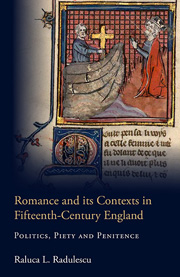Book contents
- Frontmatter
- Dedication
- Contents
- Acknowledgements
- Abbreviations
- Preface
- 1 Fifteenth-Century Contexts for the Reading of Middle English Romances
- 2 Spiritual Journeys through Political Realities: the ‘Pious’ Romances
- 3 Chronicling Britain's Christian Conversion: Henry Lovelich's History of the Holy Grail
- 4 The Politics of Salvation in Thomas Malory's Le Morte Darthur
- Afterword
- Appendix 1 Plot summaries
- Appendix 2 Genealogies
- Bibliography
- Index
2 - Spiritual Journeys through Political Realities: the ‘Pious’ Romances
Published online by Cambridge University Press: 05 October 2013
- Frontmatter
- Dedication
- Contents
- Acknowledgements
- Abbreviations
- Preface
- 1 Fifteenth-Century Contexts for the Reading of Middle English Romances
- 2 Spiritual Journeys through Political Realities: the ‘Pious’ Romances
- 3 Chronicling Britain's Christian Conversion: Henry Lovelich's History of the Holy Grail
- 4 The Politics of Salvation in Thomas Malory's Le Morte Darthur
- Afterword
- Appendix 1 Plot summaries
- Appendix 2 Genealogies
- Bibliography
- Index
Summary
The three pious romances discussed in this chapter draw on recognisable penitential models: Isumbras is modelled on the legend of St Eustace, but with a happy ending typical of Middle English romance; Robert and even Gowther typify the ‘fall of princes’ motif through the sin of pride borrowed from the biblical story of King Nebuchadnezzar. On the one hand, none of these romances conforms to a unique generic label; on the other, all three combine a variable degree of interest in family values with social restitution and harmony. Isumbras, Gowther and Robert also address a universal concern with a king's responsibilities and place emphasis on reforming a ruler's piety as well as his secular governance. To some extent these romances deserve the exemplum label since each of them focuses on a ruler's fall and subsequent extreme humbling, which render him unrecognisable/invisible in the public and private spheres. The broad outline of each story recommends it as a powerful lesson to be heeded by leaders, be they kings, princes, magnates or local lords.
The popularity of these three pious romances is evident from the variety of manuscript contexts into which they were copied, as well as from the dramatic adaptations of Robert and references to Isumbras in non-romance contexts. A better understanding of the place these romances occupied in fifteenth-century English culture requires a reassessment not only of their transmission but also of their relationship to the popular themes of kingly suffering and genealogical anxiety.
- Type
- Chapter
- Information
- Romance and its Contexts in Fifteenth-Century EnglandPolitics, Piety and Penitence, pp. 40 - 86Publisher: Boydell & BrewerPrint publication year: 2013



